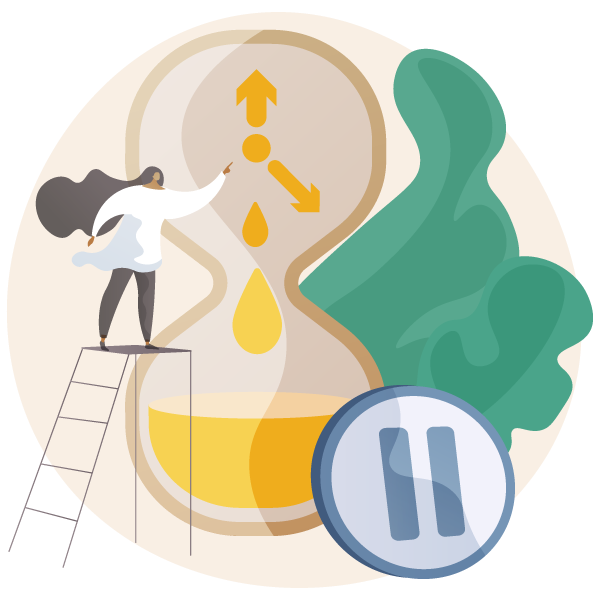Menopause
An estimated two million U.S. women reach menopause every year. But many begin to experience an array of physical, mental, and emotional symptoms long before menopause (12 consecutive months without a menstrual period). The gradual transition to non-reproductive years is called perimenopause, and usually occurs from around age 40 to 51. Perimenopause can be brought about prematurely by surgical removal of ovaries, chemotherapy, radiation therapy, or certain anti-hormone drugs. Unique for every woman, the transition can lead to symptoms that interfere with quality life. Whole-body health evaluation and care during perimenopause is vital, both to manage troubling symptoms, and to preventively address changes that can impact heart, bone, and brain health.

Focusing on the whole person, licensed naturopathic doctors (NDs) take the time to identify and address the genetic, personal medical history, hormonal, and lifestyle factors that impact perimenopause and associated health changes in women. NDs provide a high level of emotional and educational support including nutrition, nutraceuticals, botanical medicine, lifestyle counseling, hormone therapy and, at times, select pharmaceuticals.
Symptoms and Underlying Biological Changes
During perimenopause, a woman’s hormone levels change and fluctuate considerably, often leading to changes in the pattern of menstrual periods. As you become postmenopausal, reproductive hormone levels decrease, resulting in levels of estrogen and progesterone which are inadequate to produce a menstrual period. Symptoms are varied, unpredictable, and often go unrecognized as perimenopause symptoms. They can include:
 Irregular periods
Irregular periods
As ovulation becomes irregular, the length of time between periods may be longer or shorter, your flow may be lighter or heavier, and you may have random spotting or skip periods. It is important to manage excessive bleeding, and rule out endometrial hyperplasia (when the lining of the uterus becomes too thick).
 Hot flashes
Hot flashes
Hot flashes and night sweats are common, with varying intensity, length and frequency. They can be aggravated by lifestyle factors including environment, nutrition, stress, alcohol, and tobacco use. It is important to differentiate other medical conditions from menopause-related hot flashes, including hyperthyroidism, anxiety, and more.
 Vaginal dryness and thinning
Vaginal dryness and thinning
Decreased estrogen can cause vaginal tissues to become thinner, drier, and less elastic, making vaginal penetration painful. Diminishing estrogen can also leave you more vulnerable to vaginal infections, urinary tract infections, and urinary incontinence. It is important to rule out other causes of these symptoms including malignancies, vulvar dystrophies and dermatoses, infection, allergies, and skin conditions.
 Skin changes
Skin changes
Changes such as brown spots, dryness, easy bruising, and increased wrinkling may occur. Skin is partially composed of collagen, and during the first five years after the menopause, 30 percent of skin collagen is lost.
 Fatigue/sleep disturbance.
Fatigue/sleep disturbance.
Sleep problems are often due to hot flashes or night sweats, but sometimes sleep becomes unpredictable even without them.
 Decreased libido
Decreased libido
Decreased libido and other changes in sexual response are common during perimenopause. Hormone levels, anatomy, physiology, psychological factors, stressors, and co-existing medical problems are all potential contributors to changes in sexual function.
 Depression, anxiety and/or mood swings.
Depression, anxiety and/or mood swings.
The cause of these symptoms, including increased irritability and anxiety/panic disorder, may be sleep disruption associated with hot flashes, or other factors not related to the hormonal changes.
 Bone loss
Bone loss
Bone loss is caused by declining estrogen levels, and can increase your risk of osteoporosis and bone fractures.
 Changing lipid profiles
Changing lipid profiles
Decreasing estrogen levels may lead to unfavorable changes in your blood cholesterol levels, including an increase in low-density lipoprotein (LDL) cholesterol — the “bad” cholesterol — which contributes to an increased risk of heart disease. At the same time, high-density lipoprotein (HDL) cholesterol — the “good” cholesterol — decreases in many women as they age. Other symptoms associated with perimenopause can include: changes in memory and cognition, scalp hair loss, facial hair growth, acne, palpitations, nausea, and headaches.
Naturopathic Treatment
Naturopathic Treatment Using a whole-body approach and natural therapies whenever possible, NDs help women alleviate perimenopause symptoms and practice prevention to optimize health as the body ages. NDs typically spend one to two hours with patients in an initial appointment to gather information about physical, mental, emotional, genetic, environmental, social, and other factors that affect a woman’s health. NDs apply their rigorous training in clinical nutrition, lifestyle counseling, botanical and nutraceutical medicine, and other treatment modalities (including use of pharmaceuticals when state license permits) to provide individualized evaluation and therapeutic guidance, including:
Medicinal plants that contain phytoestrogens, such as ginseng, red clover, and soy to reduce hot flashes, decrease vaginal dryness, increase energy, and improve moods.

Non-phytoestrogen plants such as Black Cohosh and Kava to reduce hot flashes.

Vitamin D, calcium and other nutrient supplements to help prevent osteoporosis.

Mind-body medicine such as stress reduction, meditation, and yoga for mild to moderate depression, cognitive decline, and hot flashes.

Bacopa to improve memory.

Individual assessments and recommendations about the use of either botanicals, nutraceuticals, bio-identical hormones including customized compounds, and/or conventional hormone therapy (HT) need to be made for each woman based on her symptoms, risk factors for osteoporosis/cardiovascular disease/dementias/other conditions, and preferences. When appropriate, NDs are trained to use both conventionally available hormone replacement options and also specialty compounded hormone formulations. Their guidance both in addressing perimenopause symptoms and proactively strengthening overall health has helped countless women age through menopause with greater ease.

